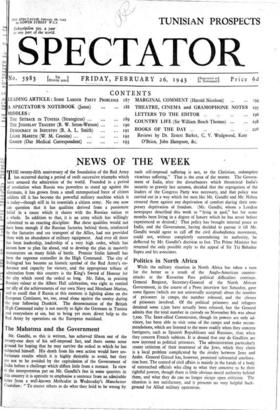The Mahatma and the Government
Mr. Gandhi, as this is written, has achieved fifteen out of the twenty-one days of his self-imposed fast, and there seems some ground for hoping that he may survive the ordeal to which he has subjected himself. His death from his own action would have un- fortunate results which it is highly desirable to avoid, but they are not to be avoided by the capitulation of the Government of India before a challenge which differs little from a menace. In view of the interpretation put on Mr. Gandhi's fast in some quarters in this country it is apposite to emphasise a sentence from an admirable letter from a well-known Methodist in Wednesday's Manchester Guardian: " To coerce others to do what they hold to be wrong by
such self-imposed suffering is not, to the Christian, redemptive vicarious suffering." That is the crux of the matter. The Govern- ment of India, after the disturbances which threatened India's security so gravely last autumn, decided that the segregation of the leaders of the Congress Party was necessary, and that policy was carried out in a way which for men like Mr. Gandhi and Mr. Nehru ensured them against any deprivation of comfort during their tem- porary deprivation of freedom. (Mr. Gandhi, whom a London newspaper described this week as " lying in gaol," has for some months been living in a degree of luxury which he has never before experienced or desired.) That policy has brought internal peace to India, and the Government, having decided to pursue it till Mr. Gandhi would agree to call off the civil disobedience movement, could not, without completely surrendering its authority, be deflected by Mr. Gandhi's decision to fast. The Prime Minister has returned the only possible reply to the appeal of Sir Tej Bahadur Sapru and his associates.


























